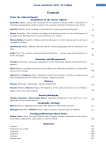Статьи журнала - Arctic and North
Все статьи: 972
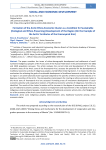
Статья научная
The paper considers the issues of ethno-demographic development and settlement of small-numbered indigenous peoples of the Arctic zone of the Russian Federation in the period between the 2002 and 2020 population censuses. The article analyzes the current state and development of the ethno-economic areas of the Arctic zone of the Krasnoyarsk Krai, assesses the potential for the development of traditional economic activity of indigenous peoples and identifies hindering factors. It is shown that the key mechanism for achieving the goals of sustainable development of traditional economic activities in the Arctic region is an active balanced cluster approach adapted to the specifics of ethno-economic habitats of indigenous minorities of the Arctic. The prerequisites and prospects for creating an ethno-economic cluster in the Arctic zone of Krasnoyarsk Krai are assessed. Promising areas of investment development of socio-economic potential and cooperative relations of traditional economic activities of indigenous minorities are identified. The results of the cluster formation will be increase in the degree of processing and in the output of traditional economic activities, increase in employment and improvement of the standard of living of indigenous small-numbered peoples, transformation of traditional economic activity into a full-fledged sector of the economy of the Arctic zone of the Krasnoyarsk Krai.
Бесплатно
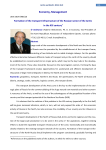
Formation of the transport infrastructure of the Russian sector of the Arctic in the XXI century
Статья научная
Large-scale of the economic development of the North and the Arctic zone of Russia must be preceded by the establishment of the transport frame, consisting of two latitude and six radial strategic railways. For the possible effective interaction between different modes of transport only in the north of the country should be established (or reconstructed) to ten major ports, which may be the key hubs in the development of the Arctic. These sites should be focused on the state logistics centers. Forming the base of the transport framework creates opportunities for accelerated and efficient development of thousands of large mineral deposits in Siberia, the North and in the Russian Arctic.
Бесплатно
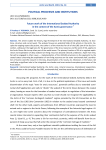
Future work of the International Seabed Authority in the context of the Arctic governance
Статья научная
The article studies the history, legal framework of the International Seabed Authority, its functions, structure and current work. The analysis focuses on potential fields of ISA activity in the Arctic. Despite the ongoing expert discussions, the author is of the view that Part XI of the 1982 Law of the Sea Convention, setting out the legal basis for the governance of the Area resources and the work of ISA, applies to the Arctic Ocean like to any other part of the world ocean. The primary function of ISA is to regulate exploration and exploitation of deep seabed non-living resources beyond national jurisdiction. Apart from that, ISA will be engaged in other issues — implementation of the UNCLOS provisions on the payments by the coastal states concerning the exploitation of non-living resources on the outer continental shelf, coordination of marine scientific research in the Area, dissemination of its results, etc. Moreover, in the future, ISA could play a significant role in the integrated cross-border and cross-sectoral ecosystem governance of the Arctic Ocean.
Бесплатно
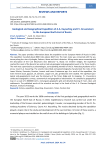
Статья научная
The paper provides information about the expedition to the European North of Russia in 1843. The expedition travelled about 8000 miles (about 8427 km). The main route was connected with the waterway along the rivers Vychegda, Pechora, Izhma and their tributaries. Hiking routes were connected with the description of the Ural Mountains sites (Bolvano—Iz, Skala). On reindeer sledges, the expedition reached the coast of the Barents Sea and carried out geological and geographical work in the Timan tundra. The work was supervised by a paleontologist, corresponding member of the St. Petersburg Academy of Sciences, Count A.A. Keyserling. The scientist described and paleontologically characterized the rocks of the Lower Silurian, Devonian, Permian, Jurassic and Lower Cretaceous age. As a result of the expedition, the main minerals (coal, gypsum, oil, domanic, copper ore, salt, grindstone) were studied. The significant geological and geographical result was the discovery of the Timan Ridge and its mapping. P.I. Krusenstern conducted topographic surveys, astronomical and geographical observations. He compiled a geographical map on a scale of 1:3000000 with a rectangular geographic grid and detailed drawing of rivers, lakes and settlements. The published works of the scientists are kept in the funds of the A. A. Chernov Geological Museum, Institute of Geology.
Бесплатно
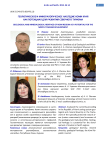
Статья научная
Analyzed the currently prevailing in the Republic of Komi saving system geological and mineral diversity in the framework of the specially protected natural areas (nature monuments) and museums of the geological and natural profiles. Geological heritage is a potential for the development of tourism in North regions.
Бесплатно
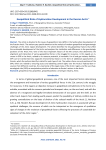
Geopolitical risks of hydrocarbon development in the Russian Arctic
Статья научная
The article is devoted to the issues of geopolitical risks (GPR) in the hydrocarbon development of the Russian Arctic. The authors pay special attention to the analysis of modern geopolitical and geostrategic challenges of the Arctic region development. The article identifies the key geopolitical factors that affect the sustainable development of the Arctic and analyzes the similarities and differences in the geostrategic positions of the Arctic Five. One of the most important factors of the XXI century that determines the alignment and interaction of various geopolitical forces is the struggle for resources. In this regard, an increase in GPR in the Arctic, related to its resource potential, is inevitable. For oil and gas industry facilities, GPR can be transformed into opposite environmental factors in the form of additional opportunities or threats, which the authors identify in detail for each type of risk. The authors focus on such positions of the GPR, which are related to ensuring access and obtaining control rights over the Arctic's hydrocarbon resources from different countries, the uncertainty of the legal status of the Arctic region, and the use of geoecological risks (GER) as manipulative priorities of attention to Russia's actions in the Arctic.
Бесплатно
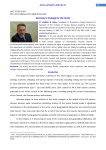
Germany's strategy for the Arctic
Статья научная
In the last decade Germany has increased activity in the Arctic region. From a formal point of view, the German state connects it with various aspects of international security (mainly — environmental and transport), with needs to respect the rights of peoples living in the Arctic regions and the importance of scientific research in the Arctic. But in reality, they are hiding far-reaching interests of safeguarding the national security of raw materials and access of German concerns to the Arctic resources. In solidarity and in many ways defining the EU's policy in the Arctic, Germany primarily is focusing on their long-term economic and geopolitical goals and objectives, which it will consistently implement in the coming years in the framework of the Arctic Council, and beyond, including within the framework of cooperation with Russia. This article is devoted to the analysis of these goals and objectives, as well as to the definition of medium-term trends in Germany's Arctic policy.
Бесплатно
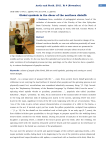
Global symbols in the décor of the northern distaffs
Статья научная
Considering constructive construction and decorative design of traditional northern distaffs, we can note reflection practically all most meaningful world symbols which to some extent are presented in ornaments and show universal concepts about structure of the world. The design of northern distaffs consists of the basis («lopast»), a leg («nozjka») and sitting or («dontce»), it represents three-parts dividing the world: the high, middle and low worlds. On the one hand the splendid and varied decor of distaffs allows to consider evolution of technological process (carving- painting), on the other hand we have a possibility to retrace development of graphic motives.
Бесплатно
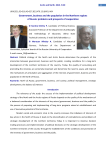
Статья научная
Political strategy of the North and Arctic Russia determines the prospects of the interaction between government, business and the public, creating conditions for a long-term development of the northern territories of the country. Today, the quality of accounting and promoting the interests are extremely important and determine the need to assess and improve the mechanisms of articulation and aggregation of the interests of government, business and the population in the North of Russia.
Бесплатно
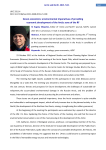
Статья научная
A short review of reports and discussions during the 2nd meeting of the Arctic expert club on October 23, 2015. The meeting was dedicated to the issues of environmental protection in the Arctic in conditions of growing economic activity.
Бесплатно
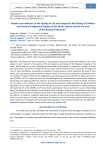
Статья научная
The attention of Arctic researchers is increasingly turning to the people who inhabit it. One of the objects of such research is the quality of life and subjective well-being of the indigenous peoples of the North, Siberia and the Far East, traditionally determined by the degree of satisfaction of needs, interests and expectations, the level of comfort of the social and natural environment for human life, the degree of trust in social institutions, accessibility and quality of social services, which determine the level of well-being, social, spiritual and physical health of people. Health is one of the key indicators of the quality of life. The analysis of health of youth of the indigenous small-numbered peoples of the North, Siberia and the Far East (ISNPNS and FE) creates the basis for the development of comprehensive health-saving programs, forecasting and organizing effective measures to preserve and strengthen the health of people arriving in the Far North in the conditions of its active industrial development. Health indicators are determined by approaches to its assessment, which involve taking into account a variety of information. Empirical data on the health factors of the ISNPNS and FE have been accumulated in Russia, but there is a lack of knowledge about the degree of their influence on the quality of life of children and youth. Representative data on the peculiarities of the health of adolescents and youth of the ISNPNS and FE of the Russian Federation in various regions, its impact on subjective well-being and quality of life are presented. Behavioral patterns in relation to various aspects of health, experiences of interaction with and attitudes towards official and alternative medicine are analyzed; environmental factors significant in the context of health care are identified.
Бесплатно
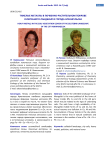
Heavy metals in the soil-vegetation cover of the selitebnii landscape of the city Arkhangelsk
Статья научная
Soils of the selitebnii landscape of Arkhangelsk is the most polluted of the forms of heavy metals (Pb, Cu and Zn) in the old part, which may be related to the type of underlying soils. The soils have a high availability of Arkhangelsk mobile forms of Cu and Zn, but the actual reserves are deficient in Co, Ni and Mn. Accumulation of heavy metals in the city plants is more intense that in natural conditions and increases in the number of row of Fe < Ni < Co < Pb < Cu < Zn.
Бесплатно
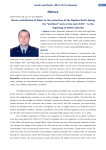
Статья научная
The article deals with difficult problems of cross-border relations in the north of Europe have not lost their importance and relevance to the present. In the work we showed the events reflected and so-called “Northern” wars middle. XVI − the beginning. XVIII centuries. In the form how they look through the lens of a key border town in the north-western border of Russia, Pskov, which was at this period the main city of Russian statehood in the Northwest and the country, was in the middle of international controversy. Article introduces the scientific revolution, some little known facts that allows to use more objective look at the history and present of the North and North-West Russia.
Бесплатно
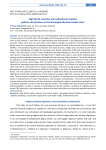
Статья научная
As the world was becoming more interdependent, with increased global awareness of the northernmost parts of the world, both the Norwegian and Russian governments showed more political commitment to and interest in new forms of region-building and development in the High North from 2006 and onwards. Today, more than ten years later, many regional changes are evident in the Norwegian-Russian border zone, as a consequence of expanded people-to-people contacts in the Barents Euro-Arctic Region (BEAR). In this peripheral border area between two national states, villages and cities have become more open, both sociologically and legally for increased cross border cooperation (CBC) and networking. In this article I will take stock of some of these borderland openings following on from the consequence of the two nations’ rising levels of interest in the High North. It explores the ways in which (inter-)national policy-making and state-substate interactions ultimately altered centre-periphery dynamics. This article has based its approach to understanding the interplay of domestic and foreign policy instruments on the ‘substate diplomacy’ literature, which argues that increased state-substate interactions constitute an efficient in-strument for extending cooperation beyond national state borders. The efficiency of regionally driven sub-state interactions is discussed from an empirical perspective. The present study analyses various High North development contexts and discourses (effective from 2008) in the Arctic borderland between Norway and Russia. The new political commitments presented in state-level official documents (the branding of the High North) envisioned a transference of new industrial-economic high tech scenarios from state to local level. These scenarios included new borderland visa regimes, co-existing with cross-border forums invest-ments in improvements of roads, infrastructure, and transport rationalisations. The present article briefly assesses these policy rationales and their outcomes, revealing the region’s contemporary geopolitical and economical potential, as well as local and regional realities. The findings show that substate governments and stakeholders are able to operate in demanding trans-border contexts, contribute to ongoing contem-porary CBC discussions, and complement national and state-level efforts by using their regional expertise to solve problems.
Бесплатно
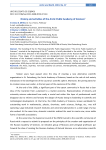
History and activities of the Arctic Public Academy of Sciences
Статья научная
The founding of the St. Petersburg Scientific Public Organization “The Arctic Public Academy of Sciences”, created at the beginning of the 21st century, is briefly described in the article. The Academy is based on the Arctic direction of the Geopolitics and Security Section of the Russian Academy of Natural Sciences. Three stages of its development are designated and commented on, as well as the main directions of the Academy's activities, and examples of projects. The Academy actively participates in international forums, conferences, summits, committees, and festivals. Being an expert scientific organization, APAS plays a vital role in civil society and consolidates domestic intellectual potential.
Бесплатно
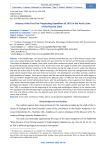
History of the First Ore Prospecting Expedition of 1491 in the Arctic Zone of the Russian State
Статья научная
In the Middle Ages, the Russian state, formed around Moscow, was in dire need of metals. However, only comparatively poor quality swamp iron was mined on the territory of the Russian principalities. There were no deposits of copper, silver, gold, or any other nonferrous metals, and all these metals had to be purchased abroad, paying mainly in furs. At the same time, the supply of metals was constantly threatened by bans from Western countries. In the 15th century, during the reign of Ivan III, under the influence and with the active help of his wife Sophia Palaeologue, the Muscovite state was strengthened and developed, which required more and more financial resources. The development of artillery created a need for large quantities of copper. There was an urgent need for own metal deposits, the search for which began in the vast northern Novgorod lands, annexed to the Moscow state. In 1491, the first state ore prospecting expedition was sent to the Pechora River basin, with the participation of ore explorers from Western Europe, which discovered copper and silver ores on the Tsilma River. The Tsilemskoye deposit was the first developed ore deposit in the history of the Russian state. The first copper smelter was built here. Therefore, 1491 is considered to be the beginning of the mining and metallurgical industry in the Russian state. This expedition marked the beginning of prospecting, exploration and mining in the newly annexed lands of the Urals and Siberia, where new ore deposits were later found, which served to create the mineral resource base of Russia.
Бесплатно
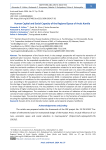
Human Capital and Social Capacity of the Regional Space of Arctic Karelia
Статья научная
The development of the Russian Arctic in the strategic perspective will require the attraction of significant labor resources. However, currently the population outflow trends prevail. The creation of territorial conditions for the expanded reproduction of human capital is of crucial importance in this context. The purpose of the study is to identify the territorial specificity of the conditions for the reproduction of human capital in Arctic Karelia in aspects reflecting the social capacity of the territory. The first task is to study the territorial conditions of human capital reproduction related to its social aspect: health care system, education system, culture, leisure and entertainment. The second task is to assess the possibility of applying the concept of social capacity of space to study the social component of the conditions of human capital reproduction. Complex economic and sociological tools are used. Information bases: Rosstat data, SPARK data, results of the population survey (autumn 2023). A comparative analysis of spatial aspects of the distribution of conditions for the reproduction of human capital and population estimates was carried out. According to the population’s estimates, the most important problems in the health care sector are the shortage of specialists, lack of modern equipment, inaccessibility of complex types of medical care and a narrow range of laboratory tests. The key problems in the field of education are lack of specialists and institutions of higher professional education, decline in the level of education and poor condition of school buildings and kindergartens. The conclusion is made about the structure of indicators of the prospective concept of social capacity of territories and the necessary addition of information bases in accordance with its conceptual logic. The practical significance of the research lies in the formation of analytical bases for ensuring the expanded reproduction of human capital in the territories of the Russian Arctic.
Бесплатно
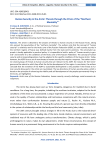
Human Security in the Arctic: Threats through the Prism of the "Northern Mentality"
Статья научная
The article is devoted to the analysis of threats to human security in the Russian Arctic, taking into account the peculiarities of the “northern mentality”. The authors note that the concept of “human security” is relatively new for the Arctic zone of the Russian Federation (AZRF), as until recently security in the northern regions of Russia was defined mainly from the state-centric positions. The universalist approach is hardly applicable in practical policy: it is impossible to build a policy of “human security in general” and transfer it to the conditions of the Arctic zone of the Russian Federation. The concept of human security and corresponding policies must be adapted to the specific conditions of the Russian Arctic. Today, however, the AZRF faces a set of new threats to human security that require a response. The authors examine several groups of threats to human security that are relevant to the AZRF, the reasons for their emergence and the extent to which they affect the further development of the region. In conclusion, the authors conclude that the transition of the AZRF to sustainable development is only possible if the threats to human security discussed in the article are neutralised. The key directions of human security policy, which is based on the principle of enhancing the viability and self-development of the peoples permanently living in the Arctic, are highlighted.
Бесплатно
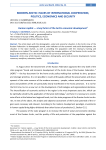
Human capital — a key factor of the Arctic economic development
Статья научная
The article deals with the demographic, social and economic situation in the Arctic zone of the Russian Federation. Its demographic trends, main indicators of the economic and social development, the situation in the labor market, as well as providing the population with the necessary training and healthcare are studied. The central role in solving the complex problems of the Russian Arctic revival belongs to the workforce as it is the main factor of the current economic growth.
Бесплатно

